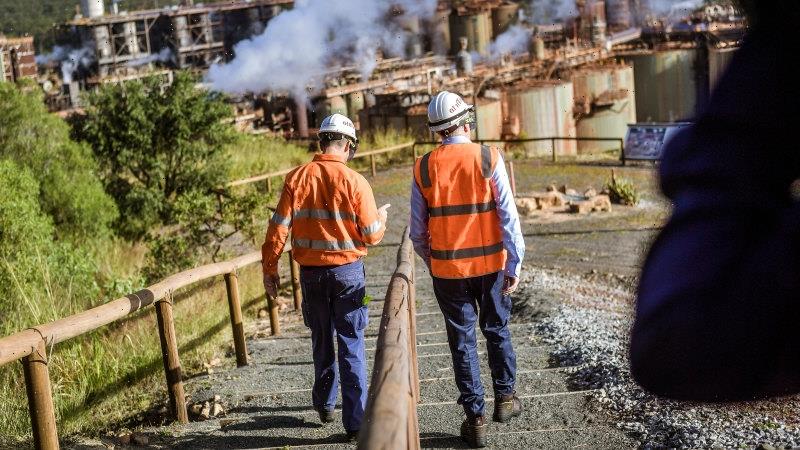Climate Change and Energy Minister Chris Bowen has called on the Coalition to back the Albanese government’s mandatory emissions cuts for big industrial polluters, saying it would be hypocritical of the Opposition to block legislation he needs to pass the Senate after it proposed similar plans when it was in office.
“I’m working on the basis that the Liberal party will support it because that element of [the scheme] was their policy,” Bowen told this masthead on Wednesday.
Rio Tinto’s Yarwun alumina refinery near Gladstone, where Climate Change and Energy Minister announced the government’s proposed shakeup to climate policy on Tuesday. Credit:AAP
But Opposition climate change and energy spokesman Ted O’Brien said the government would have to explain why it had imposed compulsory pollution cuts on business, which he said would impose new costs on industry and hurt the economy.
The political stoush in the Senate is brewing as tension emerges between the government and the gas lobby, which has called for the emissions reduction policy to be designed so new projects are not disadvantaged. Bowen confirmed on Wednesday his plan will make it harder for new oil, gas and coal projects to launch in the future.
Created by the Coalition in 2016, the safeguard mechanism granted the federal government powers to enforce caps on the nation’s 215 biggest industrial polluters, such as smelters, coal mines, gas processing plants and steelmakers.
Former prime minister Scott Morrison argued that “technology, not taxes” would enable Australian industry to cut emissions – which meant the government did not set emissions reductions targets for polluters.
But Bowen announced on Tuesday proposed changes to tighten the emissions targets from July 1 to force big polluters to cut their carbon footprint 30 per cent by 2030. The Albanese government will consult with industry until the end of February but it appears unlikely there is enough time for major changes.
These limits can be tightened under the existing regulations, without the need for a vote in parliament, but the government will rely on either the Coalition or crossbench senators to approve a bill to create safeguard mechanism credits.
Bowen wants these credits to operate in tandem with Australia’s existing carbon trading scheme, so companies captured by the safeguard mechanism can sell credits to other big polluters when they cut their emissions below their pollution caps.
The Morrison government’s energy minister Angus Taylor proposed the same type of credits in response to the King Review in 2021, but did not finalise the move before last year’s May federal election.
“The legislation is something [the Coalition] promised to do,” Bowen said. “It would be a particularly backward step for the Opposition to say we were going to do this if we were in government, but now we’re not, we’re going to vote against it.”
O’Brien said the Coalition party room will consider the government’s proposed credit scheme before it finalises its position.
He opposes the scheme in its current form, which he dubbed a carbon tax, which he argued creates unaffordable costs for businesses where cleaner technology is not available.
“This is a tax on business on regional Australia, on jobs and on families at a time when they can least afford it,” O’Brien said.
Industry representatives including the Australian Industry Group, the Business Council as well as the biggest-emitting company under the scheme, Rio Tinto, have welcomed the proposed changes.
The rules would not block new gas or coal projects but require them to meet “best practice” emissions targets.
Bowen said it will be more challenging for new coal and gas projects to gain federal government approval because the safeguard mechanism would force companies to meet a high standard of emissions compared to overseas competitors.
“It’s an appropriately high hurdle. Any new facility, regardless of what it is, would need to satisfy the government that its plan is international best practice and that emissions would fall from a low baseline,” he said.
Australian Petroleum Production and Exploration Association chief executive Samantha McCulloch said the nation’s gas producers wanted to work with the government to finalise the rules so the industry was not disadvantaged.
“The final design will need to ensure an open and competitive domestic market, without presenting barriers to entry for new industries and industry participants,” McCulloch said.
Cut through the noise of federal politics with news, views and expert analysis from Jacqueline Maley. Subscribers can sign up to our weekly Inside Politics newsletter here.
Most Viewed in Politics
From our partners
Source: Read Full Article

